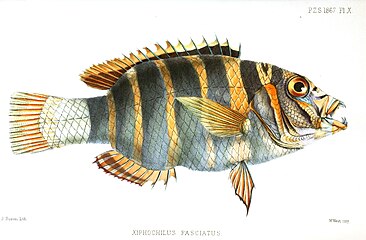Harlequin tuskfish
| Harlequin tuskfish | |
|---|---|

| |
| Scientific classification | |
| Domain: | Eukaryota |
| Kingdom: | Animalia |
| Phylum: | Chordata |
| Class: | Actinopterygii |
| Order: | Labriformes |
| Family: | Labridae |
| Genus: | Choerodon |
| Species: | C. fasciatus
|
| Binomial name | |
| Choerodon fasciatus (Günther, 1867)
| |
| Synonyms[2] | |
The harlequin tuskfish, Choerodon fasciatus, is a species of wrasse native to the western Pacific Ocean. It occasionally makes its way into the aquarium trade.
Description
[edit]The harlequin tuskfish grows to length of 30 cm (12 in).[2] It is a brightly colored marine fish with shades of blue, green, and orange. It has sharp blue teeth. The specimens found in Australia generally have brighter coloration.
Diet
[edit]The harlequin tuskfish is a carnivore, eating mostly benthic invertebrates such as echinoderms, crustaceans, molluscs, and worms.[2]
Distribution and habitat
[edit]The species is anti-equatorial. In the northern hemisphere, it ranges from Okinawa in southern Japan to the northern Philippines. In the southern hemisphere, it's range includes Papua New Guinea, the Queensland coast of Australia, Lord Howe Island and New Caledonia.[3] This species inhabits reefs at depths from 5 to 35 m (16 to 115 ft).[2]
In the aquarium
[edit]
The harlequin tuskfish is a moderately difficult fish to maintain in captivity. Juveniles can be shy and easily bullied by aggressive tankmates, while adults will be quite aggressive.[4] At a minimum, they should be kept in a 120-gallon tank for a single specimen. They will accept frozen and meaty foods such as brine shrimp, mysis, and shellfish. It is a semi-aggressive fish and ideal tankmates would include angels, tangs, and small triggerfish. However, it will not tolerate its own kind, so there should be only one specimen per tank. They are not reef-safe. Although they will typically not nip at corals or sessile invertebrates, they will attack and consume crabs, hermit crabs, snails, and shrimp.[5]
A reef temperature of 25–28 °C (77–82 °F) is ideal for maintaining the harlequin tuskfish.[2]
Gallery
[edit]-
1867 illustration
-
At Queensland, Australia
References
[edit]- ^ To, A.; Liu, M.; Sadovy, Y. (2010). "Choerodon fasciatus". IUCN Red List of Threatened Species. 2010: e.T187511A8554417. doi:10.2305/IUCN.UK.2010-4.RLTS.T187511A8554417.en. Retrieved 19 November 2021.
- ^ a b c d e Froese, Rainer; Pauly, Daniel (eds.). "Choerodon fasciatus". FishBase. August 2013 version.
- ^ Gomon, Martin F. (2017-08-28). "A review of the tuskfishes, genus Choerodon (Labridae, Perciformes), with descriptions of three new species". Memoirs of Museum Victoria. 76: 1. doi:10.24199/j.mmv.2017.76.01.
- ^ Small, James; Turner, Richard; Karleskint, George (2012). Introduction to Marine Biology (4th ed.). Cengage Learning. p. 141. ISBN 9781285402222.
- ^ "Harlequin Tusk : Saltwater Aquarium Fish for Marine Aquariums".



